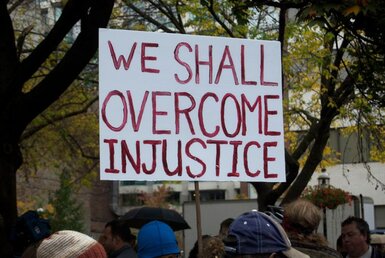
It’s no surprise that drums and bugles have been going into battle with armies for ages. Not only could orders be sent via the music, but faltering hearts could be encouraged by the sound of the drums and trumpets.
Is it any surprise then, that songs have long been a part of our protests, too? We Shall Overcome has been a part of protests since 1945 when it was sung at a strike against the American Tobacco Company in Charleston, South Carolina.
But, where did the song come from? That gets a little complicated because it is a folk song. Parts of the melody seem to go back to a song called, No More Auction Block for Me, which also bears a striking resemblance to an even older song called, O Sanctissima.
However, everyone seems to agree that the words began with the Reverend Charles Albert Tindley. Reverend Tindley was born in 1951, in Berlin, Maryland. A black man, his father was a slave, while his mother was free. Though he was never enslaved, he grew up around slaves.
After the Civil War, Tindley moved to Philadelphia, where he worked, with no pay, as the sexton of the Bainbridge Street Methodist Episcopal Church. He was never able to go to school, but he worked on his own, learning Latin, Greek, and Hebrew. He gained his ordination based on his test scores. Eventually, he became the pastor of the same church where he had worked as sexton, cleaning the floors.
In 1900, Reverend Tindley started publishing hymns that he had written. Among the most popular today are I’ll Understand It Better, By and By, and I’ll Overcome Someday. The opening verse seems particularly a propo today.
The world is one great battlefield,
With forces all arrayed:
If in my heart I do not yield,
I’ll overcome someday.
I’ll overcome someday,
I’ll overcome someday.
If in my heart I do not yield,
I’ll overcome someday.
By 1909 the song, We Will Overcome was known. While the melody is different from that written by the Reverend Tindley, the words are very similar.
But it was in 1945 that the song came to the forefront of protest movements, as We’ll Overcome. Union organizer, Zilphia Horton heard the song. Along with organizing unions, Horton was the music director for the Highlander Folk School, where she liked to end each day’s meetings with We Will Overcome.
It was here that the song came to the attention of Pete Seeger. Seeger was hugely influential in the burgeoning folk movement that was sweeping through American music. Seeger was also part of the burgeoning Civil Rights movement. At some point, Seeger decided to change the word Will to the word Shall. He liked the alliteration of We Will, but also knew that Shall was an easier word to sing. The Ah vowel allows the mouth to open more, making the sound easier to achieve. The slow rhythm of the song allows for “lining”. “Lining” is the act of chanting out the next line of a song so that the singers, who might not have the words, would know what was coming next. This comes from churches that did not have hymnals, either from poverty, illiteracy, or both. But this lent itself quite well to the protest song concept, where the words could be adapted to each occasion.
About the song, Pete Seeger had this to say: “It’s the genius of simplicity. Any fool can get complicated.”
The song has been translated into many different languages and used in many different settings. But it always is an anthem of hope.
Hope is something that I need right now, and I imagine that you do, too. What songs give you hope? What songs do you find yourself singing in this time of pandemic and riots? We Shall Overcome.
I’ll be playing this and other songs that give me hope on my Minnich Music FaceBook page this week, so be sure to check those out.
Until next time!
 RSS Feed
RSS Feed